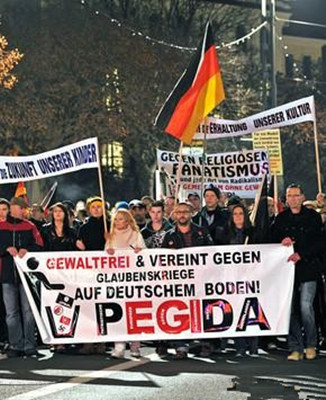德国仇外
Peaceful, but menacing
和平的方式也具有威胁性
A new movement with a barely hidden message of hate unsettles Germany
一场隐藏着仇恨信息的新运动使德国动荡不安
We don't need no Muslims here
我们不需要穆斯林
CALLING themselves Pegida, or “patriotic Europeans against the Islamisation of the Occident”, since October they have marched through Dresden every Monday. Their numbers are growing: on December 15th 15,000 protested. Their slogans of xenophobic paranoia (“No sharia in Europe!”) seem bizarre in Saxony, where only 2% of the population is foreign and fewer than 1% are Muslim.
就叫这群人Pegida吧,或者是“反对西方伊斯兰化的爱国欧洲人”。他们自10月起每周一就游行穿行德累斯顿。他们的人数在壮大:截至12月15日抗议者已达到15000.他们偏执排外的口号(“欧洲拒绝伊斯兰!”)在外来人口仅2%、其中穆斯林所占比例不到1%的萨克森显得匪夷所思。

The marchers make no attempt to explain their demands. Convinced of a conspiracy of political correctness, they do not speak to the press. Few bear any signs of neo-Nazism. They have eschewed violence. What they share is broad anxiety about asylum-seekers (200,000 in 2014) and immigrants.
游行者们并未试图去解释他们的诉求。由于相信政治正确性的阴谋论,他们拒绝与媒体对话。他们并没有任何新纳粹主义的举动,而是避免暴力。他们共有的只是对难民(2014年达到了20万)和移民的广泛担忧。
The instigator is Lutz Bachmann, owner of an ad agency who once fled to South Africa to avoid being locked up for dealing drugs. He has imitators in other cities: Bonn has a Bogida march, Würzburg a Wügida. But eastern Germany, especially Dresden, is the movement's base. Counter-demonstrations have sprung up, but their numbers in Dresden (about 5,600 this week) are dwarfed by Pegida's. Chancellor Angela Merkel accused Pegida of “agitation and defamation”; Heiko Maas, the justice minister, called it a “disgrace for Germany”.
这场运动的煽动者是Lutz Bachmann,他名下有一家广告公司,并曾为了逃避因毒品交易入狱而逃往南非。他在其它城市也有模仿者:波恩有一个名为Würzburg a Wügida的Bogida游行。但是东德,尤其是德累斯顿,是这场运动的大本营。反游行派也如雨后春笋般涌现,但他们在德累斯顿的人数(本周大约5600人)与Pegida相比就相形见绌了。总理安吉拉·默克尔指责Pegida“煽动和诽谤”;司法部长Heiko Maas则称这为“德国的耻辱”。
But the CSU, a centre-right party in Bavaria that governs with Mrs Merkel, was more nuanced. Calling Pegida a disgrace amounted to “a massive denigration of peaceful protesters,” said a spokesman. The CSU had made news by saying that foreigners should be forced to speak German even “in the family”, though it later backtracked. The leader of the new anti-euro party, Alternative for Germany, Bernd Lucke, said he considered Pegida's demands “legitimate”.
但是默克尔掌管的巴伐利亚的中右翼党派CSU却态度微妙。他们称Pegida为耻辱等同于是对“和平抗议者的大规模诋毁,”一名发言人如是说。CSU发表新闻称外国人“即便是在家里”也应该被强制说德语,尽管这条新闻后来被撤销。新反欧党派德国新选项党的领导人Bernd Lucke称他认为Pegida的要求是“合理的”。
Germany remains a tolerant place, one reason why some 465,000 migrants arrived last year, making it the world's second most popular destination after America. But Pegida is a reminder that many, especially in eastern Germany, harbour resentments that can be exploited. “We are the people,” the marchers in Dresden shouted. It was the phrase East Germans used in 1989 in protest against their communist overlords. To outsiders, the cry now sounds chilling.
德国仍旧处于容忍状态,这是去年约465,000名移民来到德国的原因之一,同时这也使德国成为仅次于美国的第二大移民地。但是Pegida正警示了在很多地方,尤其是东德,港口怨恨可以被利用。“我们才是这个国家的主人,”德累斯顿的游行者们高声疾呼。这是东德人民在1989年抗议他们的共产主义霸主所用的口号。在外人看来,这怒吼如今听上去让人不寒而栗。译者:邵夏沁 校对:王颖













